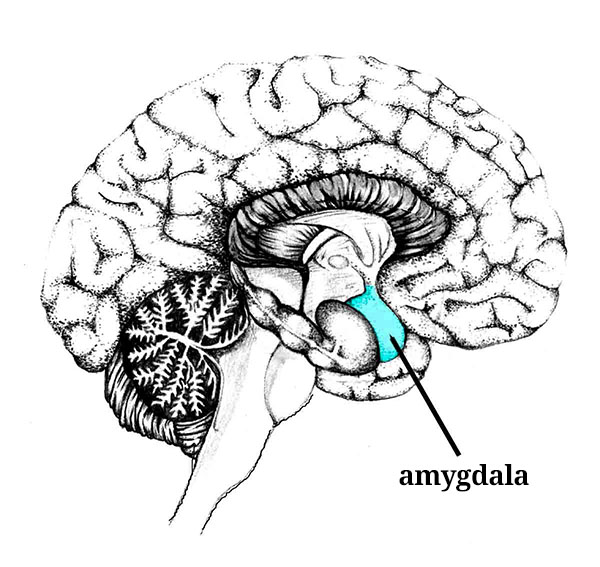Whether with a colleague, friend, or family member, conflicts are a natural and inevitable part of being human. They can occur over differences of opinion and communication in goals, strategies, money, politics, and more. While they can destroy relationships when managed poorly, learning how to manage conflict in a healthy manner can actually lead to stronger relationships. But first, let’s have a look at the two emotions that drive most conflicts: anger and frustration.
The neuroscience of anger
What exactly happens inside your brain when you’re angry with someone? From a science standpoint, anger is defined as a response to a perceived threat to oneself or to another. This results in what researchers call “reactive aggression”—instead of being defensive, we go into attack mode.
While many areas of the brain are involved in anger—such as the hypothalamus and periaqueductal gray mediate—the main area that gets activated when we’re angry at someone is the amygdala. To visualise the amygdala, imagine two almond shaped clusters of nerves located right beneath your temples. The amygdala is involved in memory, decision-making and—most importantly in the case of anger—in emotional responses such as fear, anxiety, and aggression. In fact, many studies found that PTSD patients who have an increased risk for anger also had increased amygdala activity.

The amygdala is also the primary structure of the brain responsible for the fight or flight response, a physiological reaction that happens in response to a perceived harmful event or threat to our survival.
Frustration and anger are deeply linked together. Frustration happens when we keep on doing something in the expectation of a reward, but we don’t receive that reward. For example, explaining something over and over to someone, but not getting them to understand. Or trying to understand a problem, only to keep on failing. When we feel frustrated for a long time, frustration often turn into anger. So what to do about it?
Managing anger to manage conflict
Many people try to repress their feelings when they’re angry with someone. This is actually the worst thing to do. Researchers stated that “experimental studies have reported that suppression leads to less linking from social interaction partners and to an increase in partners’ blood pressure levels.”
But dwelling on it is not good either. Scientists found that focusing on a negative emotion will actually make the experience of that emotion more intense. Moreover, you will be using precious cognitive energy that would probably be better used elsewhere. So how do you manage conflict in a healthy way?
“You don’t get frustrated because of events, you get frustrated because of your beliefs.”
Albert Ellis, American psychologist and creator of the Rational Emotive Behavior Therapy.
The key to manage conflict lies in what’s called reappraisal. Imagine someone is being rude to you. Maybe they’re raising their voice, not listening to what you have to say. You feel frustrated, then angry. You want to shout back at them.
Now, imagine I told you their dad passed away yesterday. How would you feel? You’d most likely feel compassion towards them. You’d understand why they are behaving this way. Reappraisal consists in analysing your triggers and reframing your anger to think: “It’s not about me. They are having a bad day.”
In a reappraisal experiment, participants were shown a photo of people crying outside a church, which obviously made them feel sad. They were then asked to imagine the scene was a wedding, and that people in the photo were actually crying tears of joy.
When participants changed their appraisal of the event, their emotional response changed. The researchers scanned their brains and found that the chemical reactions in their brains changed too. As the lead researcher explained: “Our emotional responses ultimately flow out of our appraisals of the world, and if we can shift those appraisals, we shift our emotional responses.”
Strategies to manage conflict
Once you have been through reappraisal and feel more calm, you can apply simple conflict management strategies to de-escalate the situation.
- Be constructive. Explicitly show the other person that you want to resolve the conflict. Say “I would like to resolve this together.” Be honest with yourself and try to be as transparent as possible as to why you think the conflict arose in the first place.
- Show you care. Demonstrate how much you care about the other person. Showing vulnerability is a powerful way to connect with someone on a deeper level. Ultimately, you are both human beings who are struggling to communicate with each other. Showing you care can go a long way in having a constructive conversation.
- Ask questions. Don’t assume anything—try to really understand where the other person is coming from.
- Avoid blame. Instead of using “you”, say “I” to explain how the situation makes you feel. A judging tone will only aggravate the situation.
- Take your time. Do not threaten with an ultimatum. When it’s your turn to speak, slow down, pause, and reflect. It’s okay to take a break if one or both people are starting to feel angry again. Not all conflicts can be resolved with a short conversation. You can take a break by saying “I’m feeling too emotional right now, but I would love to talk about it again when I’m calmer.”
Not all conflicts can be resolved, but the process of trying to solve things can be less painful for both parties if they use reappraisal as well as these five strategies to manage conflict. It means less frustration, less anger, and better relationships.
